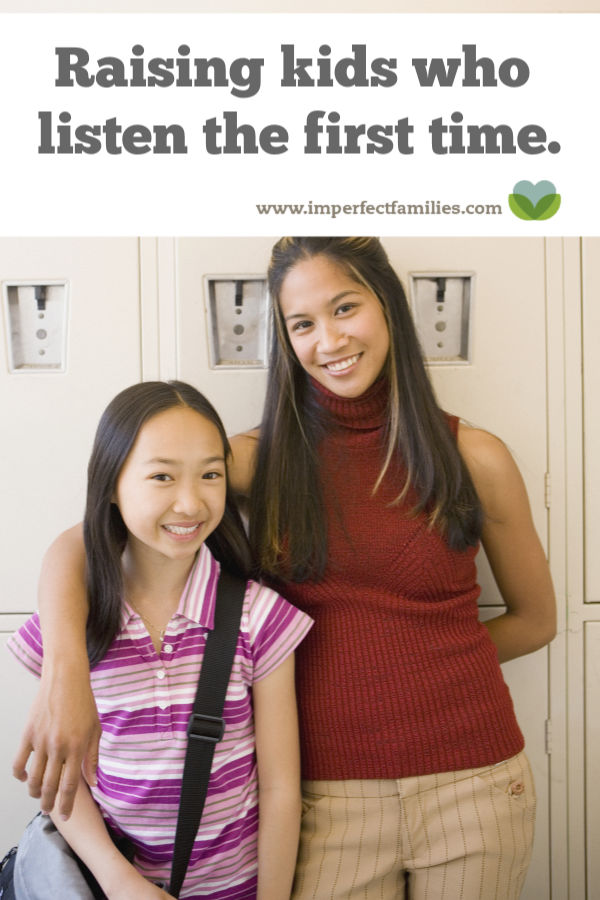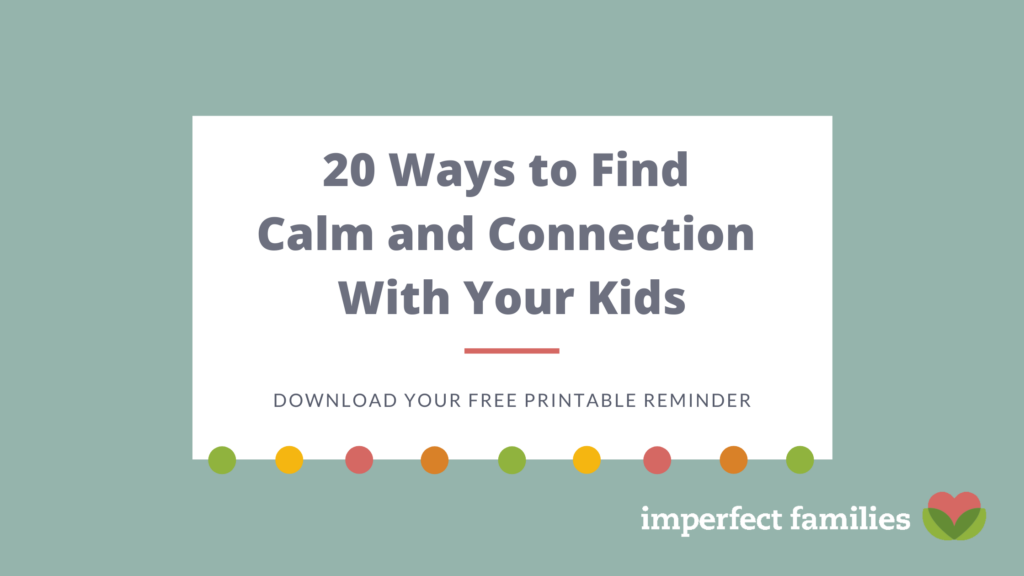Stop repeating yourself 1,000 times. Stop bribing or threatening your kids to listen. Use these tips to encourage your kids to listen the first time you ask them to do something.

You’re tired of repeating yourself 1000 times.
You’re tired of the constant arguing — the disagreeing with everything you say.
Would it be so hard for them to listen the first time?!
Believe it or not, it is possible for you to raise kids who actually listen. In fact, it’s possible for you to raise kids who listen willingly!
Not quite sure how?
Well, I’ll let you in on a little secret…good communication starts with you.
That means, instead of using some sneaky bribes or threats to coerce your kids into listening, you’re going to focus on what you can actually control: YOU.
You may have to make some changes. You may have to try something new. And, you are going to have to take control of your own emotions.
But don’t panic, it can be done!
5 Ways to Raise Kids Who Listen the First Time
- Build a Strong Connection: Intentionally step back from the reminders, the prodding, the arguing, and focus on building a strong relationship with your child. This might mean spending 10 minutes playing together daily, taking time to ask about a project they’re working on, putting a joke in their lunchbox, or chasing them around the yard for a few minutes. Kids who feel connected to their caregivers are more likely to want to keep this relationship strong by doing what they ask. Learn more about connection here.
- Listen with the Intent to Understand: Kids are longing to be “heard” by their parents, to know that their parents really get what they are going through. Instead of restating a rule, enforcing a consequence, or trying to fix the problem, stop talking. Take a deep breath and listen. Then, respond with empathy — put yourself in your child’s shoes. What are they going through? What are they trying to tell you? What might they be feeling right now? How would you like someone to respond to you?
- Embrace Disagreements: Conflict is part of living together in a family, but it does not need to tear people apart. Create an atmosphere in your home where people can express their opinions respectfully. Model the behavior you would like to see. Introduce phrases like, “Thank you for telling me how you feel” or “It’s ok to disagree.” Resist the urge to “have the last word” or “win” an argument. When kids feel that their opinions are valid, there is less need to challenge their parent’s perspective. Here’s how to have a respectful disagreement.
- Invite Cooperation: Kids need limits and boundaries to feel safe and secure, but instead of having a “my way or the highway” attitude, open up a conversation about how these are enforced. Bring the problem to the table and work together to find a solution that works for everyone involved. You might say, “I’ve noticed we have a lot of fights about getting up for school on time. I’m wondering if you have any ideas about how that could go better.” Kids who have a say are more likely to buy into the solution. Learn how to brainstorm together.
- Give Respect: Behaviors like eye-rolling, sarcasm, criticism, and belittling are damaging to good communication. If you are tired of seeing and hearing these behaviors from your kids, take a look at your own actions first. See if your words and expressions are kind and respectful. As the adult, model the behavior you would like to see from your kids by making changes to your own communication first. When kids feel respected, they are more likely to treat others with respect. Related: 9 Communication Tips to End Grunts, Groans and Eye Rolls from Your Kids
Changing Communication Is a Process
Feeling a little overwhelmed? Unsure?
That’s ok. You don’t have to make a complete overhaul of your communication overnight. Take baby steps.
Focus on one thing you’d like to do differently today. Then, try it again tomorrow, and the next day. Pretty soon, you may not have to think so hard about it.
When you’re ready, add in another strategy and give that a try for a few days.
You don’t have to be the perfect parent and respond perfectly 100% of the time. It’s ok to mess up or slip back into old patterns. The key is acknowledging the mistake and moving forward.
Don’t worry if these tips don’t lead to immediate improvement. Changing patterns of communication takes time. Stick with it!
Before long, you may realize that you don’t have to repeat yourself as often. Or that there is less arguing in the house.
And maybe…your kids are actually starting to listen the first time! (Woo hoo!)
Continue Working on Communication!
Now that you’ve got a foundation, keep working to build an atmosphere of respectful communication in your home! The “Communication for Imperfect Families” e-course is a self-paced online course designed to help you identify and change negative or unhealthy communication patterns. Learn more and register today!
Personalized Help is Available
If this all seems well-and-good for other families, but there’s “no way” it would work for yours, it’s time to set up an online parent coaching session. We’ll get together online and talk through your challenges and find solutions that will actually work for your unique family. Learn more and schedule your first session today!




Comments have been turned off to retain the privacy of all families. If you have a question or comment on the topic, you're always welcome to contact me.